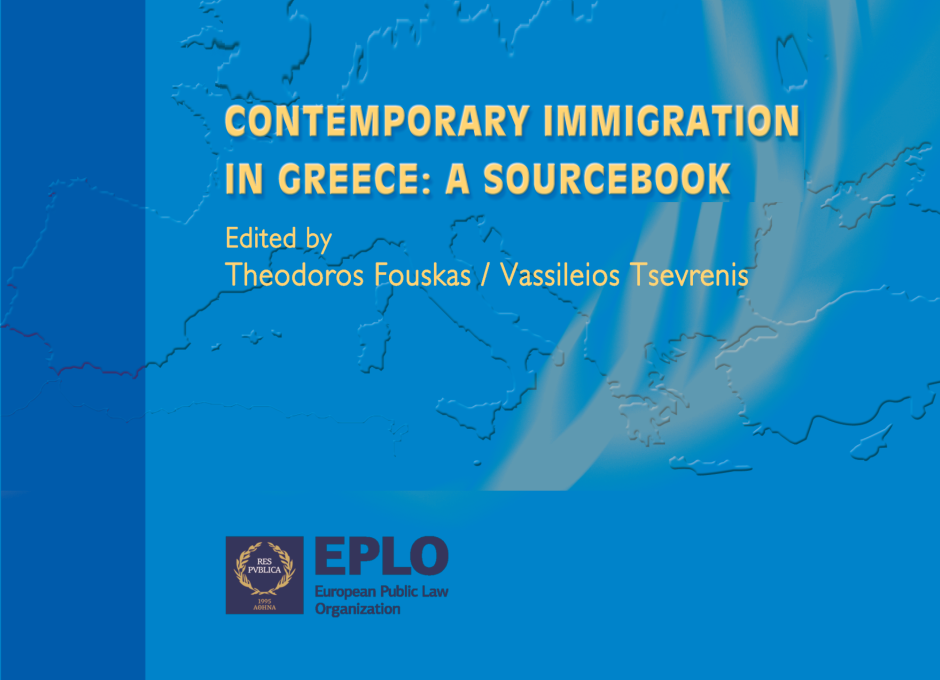Theodoros Fouskas and VassileiosTsevrenis (Editors)
Contemporary Immigration in Greece: A Sourcebook
European Public Law Organization (EPLO) Publications
2014
Pub. Date: 2014 – 4th Quarter
Binding: Hardcover – Softcover – eBook
ISBN: 978-618-81128-7-2
|
This book:
This book examines the immigration phenomenon which constitutes a major concern to modern societies like Greece. It is directly associated with a multitude of parameters affecting the reception societies, their institutions, and immigrants’ distinctiveness and particularities. Greece has developed, from a once sending country of immigrants who moved in the first half of the 20th century to overseas countries and during the post-war period to Western European countries after the fall of their respective regimes, to a receiving country of immigrants. For the very first time, Greek society had to deal with immense immigrant flows from the neighbouring Balkan countries, the Republics of the former Soviet Union as well as considerable numbers of immigrants from African, Middle East and Asian countries. The book explores theoretical and empirical approaches, analyses the new policies and presents the latest researches in Greece, interrogating the relationship between immigration and immigration policy, institutional context of immigration and asylum management, work and employment, education, access to health care and social services, coexistence with the native population, formation of community associations and representation and judicial treatment and criminalization of immigrants. Each of its chapters, written by experts, explores how the conditions in the country, the policies, the politics, the values and attitudes influence the process of immigration and subsequently affect the immigrants, migration, and the nation as well. Contributors argue and suggest tangible solutions to imperative issues, explore current patterns and policies of immigration, while their contributions balance these and other conflicting concerns that require the substantive and expert discourse offered in this book. Focusing on the rational management of legal and illegal/irregular migration flows and the pursuit of justice and maintenance of security, coupled with respect for fundamental human rights, the volume is a practical handbook for researchers and students, government institutions or agencies and those involved in the phenomenon of immigration and immigration policy. |
CONTENTS
Editors and Contributors …..xvii
Acknowledgments …..xxiii
Preface by SPYRIDON FLOGAITIS …..xxv
1. THEODOROS FOUSKAS / VASSILEIOS TSEVRENIS
Introduction: Challenges of Immigration in 21st Century Greece …..1
PART I
IMMIGRATION POLICY
2. PROKOPIS PAVLOPOULOS
The Greek Immigration Policy between 2004-2009 …..35
3. NESTOR COURAKIS
Towards a Greek Immigration Policy with Humanity and an Effective Outcome …..45
4. IOANNIS KOTOULAS
A New Instrumental Framework of Greek Citizenship …..51
5. PHILIPPE NÉLIDOFF
Simples regards d’un historien du droit sur l’évolution des politiques migratoires françaises …..71
PART II
ASYLUM AND BORDER MANAGEMENT
6. PATROKLOS GEORGIADIS
The Reform of Greece’s Asylum and Migration Management System …..87
7. GIORGOS PAPANIKOLAOU
Solidarity and Fair Burden Sharing in EU Migration and Asylum Policy …..99
8. DANIEL ESDRAS
Border Management in Greece …..107
9. CHRISTOS THEODOROPOULOS
The Management of Mixed Migration and Local Integration of Refugees: Problems and Prospects …..117
PART III
IMMIGRANT WORK AND EMPLOYMENT
10. IORDANIS PSIMMENOS
Approaching Domestic Work and Servitude …..127
11. THEODOROS FOUSKAS
“Community” Found or Lost in the City? The Consequences of Precarious, Low-status Work on Association Participation of Nigerian Immigrant Workers in Greece …..143
12. KATERINA VASSILIKOU
Children’s Care and its Shortcomings in a Transnational Context …..165
13. ANGELO TRAMOUNTANIS / MANOLIS CHRYSAKIS / DIONYSSIS BALOURDOS
Integration of Second-generation Immigrants in Greece: Educational and Employment Aspects …..177
PART IV
IMMIGRANT EDUCATION
14. ISMINI KRIARI
The Challenges of Intercultural Education for Greece ………………199
15. EVANGELIA KALERANTE
Economic Crisis and Economic Management of Education: Ideological and Political Consequences of its Predominance in Migrants’ Education …..207
16. CHRISTINE MILESSI
The Management of “Belong” to the School Community: Field Research of Albanian Pupils in the Civil Environment of Piraeus …..223
17. STAMATIA PASCHALIORI
Human Rights and Volunteering: Their Role in the Decrease of Racist Behaviors in the Hellenic School …..239
18. MARIA DELLATOLA
Difficulties in the Integration and Adjustment of (Semi)nomad Roma Children in Primary Education …..253
PART V
ACCESS OF IMMIGRANTS TO HEALTH CARE AND SOCIAL SERVICES
19. VASSILIS KIKILIAS
Illegal Immigration Flows to Greece and Implications for Public Health …..271
20. GEORGE ANASTOPOULOS / DAPHNE KAITELIDOU / PETROS GALANIS / OLGA SISKOU / MAMAS THEODOROU / EUGENIA KOULI / KONSTANTINOS TSAVALIAS
The Knowledge and Use of Health Services in Greece by Immigrants ……281
21. ELLI IOANNIDI-KAPOLOU / KATERINA VASSILIKOU
Intercultural Mediators in Greek Hospitals: First Assessment …..297
22. CHRISTINA TSAKALOU
Social Services and Procedures of Social Exclusion for Immigrants/Victims Sexually Exploited in Greece …..307
PART VI
COEXISTING WITH IMMIGRANTS
23. VASSILEIOS TSEVRENIS
Social Discontent and Inefficient Immigration Policies: An Emerging Danger for Democracy in Europe …..321
24. JOANNA TSIGANOU
Aspects of Racism and Xenophobia in Contemporary Greece …..329
25. PANOS HATZIPROKOPIOU / VENETIA EVERGETI
Performing and Practicing Islam in the Orthodox City: Religious Space and Places of Worship of Muslim Migrants in the Athenian Urban Landscape …..339
26. ATHANASIOS KARANTJIAS / NINETA POLEMI
Collaboration in Harmonising Immigrant Processes with the Use of Innovative Technologies …..355
PART VII
IMMIGRANT COMMUNITY ASSOCIATIONS AND REPRESENTATION
27. MAAROUF ALOBEID
Syrian Refugees in Greece …..381
28. ZAINOUL ABEDIN
The Conditions of Bangladeshi Immigrants in Greece …..395
29. JAMIL M. SYED
Immigrants from Pakistan in Greece: Progress and Regression …..399
30. THEODOROS FOUSKAS
Representation and Participation of Immigrants in Public Life: Immigrant Consultative Bodies at Local Level in Greece …..407
PART VIII
JUDICIAL TREATMENT AND CRIMINALIZATION OF IMMIGRANTS
31. GEORGE P. NIKOLOPOULOS
The Changing Concepts of Frontiers and Territorialities in the “Area of Freedom, Security and Justice” and the Criminalization of Migration …..447
32. VASSILIS KARYDIS
Immigrants and “Moral Panics” in Greece …..463
33. EVANGELIA VAGENA-PALAIOLOGOS
Legislative and Judicial Treatment of Immigrants …..477
34. CHARA KAFKA
Immigration as a Factor of Social Cohesion Catalysis: The Role of Law in its Preservation …..493



